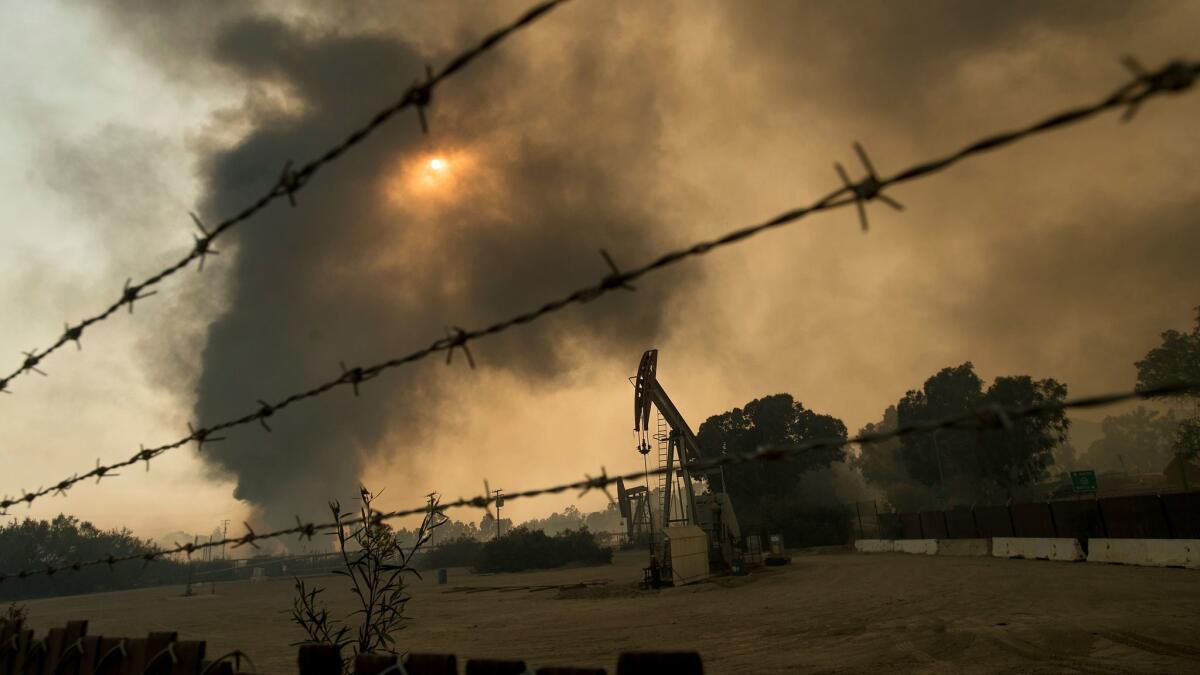Op-Ed: Keeping California’s dirty oil in the ground would be Jerry Brown’s most powerful legacy

As Gov. Jerry Brown took a climate-change advocacy lap around Europe last month, he had reason to hope that one glaring flaw in California’s fossil-fuel-emission policies would escape notice: For all of the state’s laudable efforts to reduce demand for fossil fuels, it has done nothing to reduce the supply of oil produced in the state. California is the third-leading oil producer in the U.S., and much of that oil is almost as “dirty” as the notorious crude from Canada’s tar sands. By the time this extra-heavy oil is extracted, refined and consumed, it contributes much more to climate change and air pollution than lighter crude produced elsewhere.
The truth is that Brown has so far declined to take on Big Oil. That’s why hecklers at the November Bonn climate conference chanted at him, “Keep it in the ground!” and why he momentarily lost his composure, shouting back, “Let’s put you in the ground!”
Brown argues that the state must keep pumping oil until the transition to clean energy is complete. And, he says, the state’s environmental regulations ensure that oil produced here will be cleaner than oil produced in less-developed countries.
But another reason for oil’s staying power in California is the oil industry’s political might. According to a report in February by investigative journalists at the nonpartisan Center for Public Integrity, Big Oil spent $122 million on lobbying and campaign contributions in the state in the previous six years. As the report put it, the oil industry “routinely spends more on lobbying than any special interest in California,” and invests heavily in attack ads and mailers to influence our elections.
According to the report, those outlays have helped the likes of Chevron to win new drilling permits despite evidence that the wells may contaminate aquifers used for drinking water. California oil producers also have successfully resisted a proposed ban on fracking and avoided the imposition of a tax on oil extraction, a levy assessed in all other leading oil-producing states, including Texas. Since 2009, a year before Brown started his second stint as governor, the number of active oil and gas wells in the state has increased 23%, according to a 2017 report by Santa Monica-based Consumer Watchdog.
While new wells are coming online, drillers continue to exploit even the dirtiest dregs of the state’s existing fields. At Kern County’s Midway-Sunset oil field, the state’s oldest and biggest oil field, all that’s left after 120 years of pumping is crude with the consistency of peanut butter, so thick that it must be injected with steam to get it to flow — as much as 40% of the nearly 200 million barrels of crude produced in the state has similar characteristics. To extract such oil and refine it (mostly into gasoline) requires natural gas to create steam. One byproduct, petroleum coke, or petcoke, is so dirty it can’t be burned in the U.S. It is sold and shipped to other countries, including India, where it may be used instead of a cleaner fuel: coal.
If Brown truly believes that climate change is an ‘existential crisis,’ he should instruct state regulators to stop approving new oil wells.
Officials could begin addressing these gaps in California’s green resumé by collecting assay data on what its wells and refineries produce, so the increasingly carbon-heavy composition of the state’s oil could be tracked and regulated. The state should also promote innovation to reduce the carbon footprint of its extra-heavy oil, as Canada is doing. There, the government has financed such promising approaches as using microbes to convert the chemical energy in crude oil into electricity while the crude is still in the ground. And California should ban the export of petcoke.
Measures like these are no-brainers, but they’re far from sufficient. As a September 2016 report by Oil Change International, a Washington-based advocacy group, showed, the potential carbon emissions of reserves in the world’s operating oil fields and coal mines are enough to warm the planet beyond the limit set by the 2015 Paris climate accord. To meet that goal, expansion of the oil and gas industry must stop, and undeveloped oil must be left in the ground. What better place to start leaving it there than California?
Brown argues that as long as the state sharply cuts its oil dependency, as his policies prescribe, oil supply and extraction will simply fall away. But balancing state demand against production ignores the realities of the market, in which demand for oil in other parts of the world remains high.
If Brown truly believes that climate change is an “existential crisis,”as he has said, he should instruct state regulators to stop approving new oil wells in California. Until that happens, along with new controls on existing production, the state won’t be on a path towards climate stability.
The timing is propitious. California’s economy is thriving and diverse, so the managed decline of oil wouldn’t deliver a crippling blow. And Brown says he isn’t running for office again, so he has nothing to lose. While his two pet mega-projects, high-speed rail and the Sacramento-San Joaquin River Delta twin tunnels, face uncertain futures, taking on Big Oil is more important, and could prod other leaders to follow. “Keeping it in the ground” is the most powerful legacy he could leave behind.
Jacques Leslie is a contributing writer to Opinion.
Follow the Opinion section on Twitter @latimesopinionand Facebook
More to Read
A cure for the common opinion
Get thought-provoking perspectives with our weekly newsletter.
You may occasionally receive promotional content from the Los Angeles Times.










